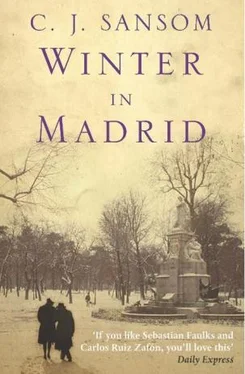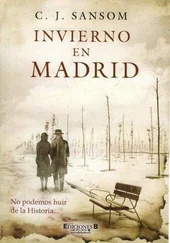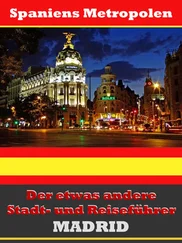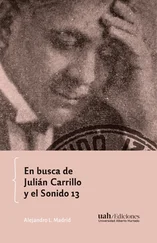‘ No. Inglés. ’
The barman raised his eyebrows and turned away. Harry went and sat at a bench. He picked up a discarded copy of Arriba , the Falange newspaper, the thin paper crinkling. On the front page a Spanish border guard shook hands with a German officer on a Pyrenean road. The article spoke of eternal friendship, how the Führer and the Caudillo would decide the future of the Western Mediterranean together. Harry took a sip of the wine; it was harsh as vinegar.
He studied the picture, the breathless celebration of the New Order. He remembered telling Bernie once that he stood for Rookwood values. He had probably sounded pompous. Bernie had laughed impatiently and said Rookwood was a training ground for the capitalist elite. Maybe it was, Harry thought, but it was a better elite than Hitler’s. Despite everything, that was still true. He remembered the newsreels he had seen of the things that happened in Germany, elderly Jews cleaning the streets with toothbrushes amidst laughing crowds.
He looked up. The barman was talking quietly to a couple of the old men. They kept glancing at him. Harry forced himself to drain his glass and got up. He called ‘ Adiós ,’ but there was no reply.
There were more people about now: well-dressed, middle-class office workers making their way home. He passed under an archway and stood in the Plaza Mayor, the centre of old Madrid, of festivals and pronunciamientos . The two big fountains were dry but there were still cafes round the broad square, little tables outside where a scattering of office workers sat with coffees or brandies. Even here, though, the shop windows were half empty, paint flaking from the ancient buildings. Beggars huddled in some of the ornate doorways. A pair of civiles circled.
Harry stood irresolutely, wondering whether to have a coffee. The street lights were starting to come on, weak and white. Harry remembered how easy it was to get lost in the narrow streets, or trip in a pothole. A couple of the beggars had risen and were walking towards him. He turned away.
As he left the square he noticed that a woman walking ahead of him had stopped dead, her back to him: a woman in an expensive-looking white dress, red hair covered with a little hat. He stopped too, astonished. Surely it was Barbara. That was her hair, her walk. The woman began walking again, turning rapidly down a side street, moving quickly, her figure fading to a white blur in the dusk.
Harry ran after her, then stood irresolute at the corner, unsure whether to follow. It couldn’t be Barbara, she couldn’t still be here. And Barbara would never have worn clothes like that.
THAT MORNING BARBARA had woken as usual when the church clock across the road struck seven. She rose from sleep to the heat of Sandy’s body beside her, her face resting on his shoulder. She stirred and he made a gentle grunting noise, like a child. Then she remembered and guilt stabbed through her. Today she was meeting Markby’s contact; the culmination of all the lies she had told him.
He turned and smiled, eyes heavy with sleep. ‘Morning, sweetie-pie.’
‘Hello, Sandy.’ She brushed a hand gently across his cheek, spiny with stubble.
He sighed. ‘Better get up. I’ve got a meeting at nine.’
‘Have a proper breakfast, Sandy. Get Pilar to make you something.’
He rubbed his eyes. ‘It’s OK, I’ll get a coffee on the way.’ He leaned over, smiling mischievously. ‘I’ll leave you to your English breakfast. You can eat all the cornflakes.’ He kissed her, his moustache tickling her upper lip, then got up and opened the wardrobe next to his bed. As he stood selecting clothes, Barbara watched the play of muscles in his broad chest and flat, ridged stomach. Sandy did no exercise and ate carelessly; it was a mystery how he kept his figure, but he did. He saw her studying him and smiled, that Clark Gable curl of the mouth to one side.
‘Want me to come back to bed?’
‘You’ve got to get off. What is it this morning, the Jews’ committee?’
‘Yes. There’s five new families arrived. With nothing but what they could carry from France.’
‘Be careful, Sandy. Don’t upset the régime.’
‘Franco doesn’t mean the anti-Jewish propaganda. He has to keep in with Hitler.’
‘I wish you’d let me help. I’ve so much experience dealing with refugees.’
‘It’s diplomatic stuff. Not a job for a woman; you know what the Spaniards are like about that.’
She looked at him seriously; felt guilt again. ‘It’s good work, Sandy. What you’re doing.’
He smiled. ‘Making up for all my sins. I’ll be back late, I’ve a meeting at the Ministry of Mines all afternoon.’ He moved away to his dressing table. At that distance, without her glasses, Sandy’s face began to blur. He laid the suit he had chosen over the back of a chair and padded off to the bathroom. She reached for a cigarette and lay smoking, as he splashed about. Sandy returned, shaved and dressed. He came back to the bed and bent to kiss her, his cheeks smooth now.
‘All right for some,’ he said.
‘It’s you that taught me to be lazy, Sandy.’ Barbara gave a sad half-smile.
‘What are you doing today?’
‘Nothing much. Thought I might go to the Prado later.’ She wondered whether Sandy might notice the slight tremor that came to her voice with the lie, but he only brushed her cheek with his hand before going to the door, his form turning to a blur again.
SHE HAD MET Markby at a dinner they had given three weeks before. Most of the guests were government officials and their wives; when the women left the tables there would be deal-making among the men, perhaps a Falangist song. But there was a journalist as well, Terry Markby, a Daily Express reporter Sandy had met in one of the bars the Falange people frequented. He was a mousy, middle-aged man, his dinner jacket too large for him. He looked ill at ease and Barbara felt sorry for him. She asked what he was working on and he leaned close to her, lowering his voice. He had a heavy Bristol accent.
‘Trying to find out about these concentration camps for Republican prisoners. Beaverbrook wouldn’t have taken stories like that during the Civil War, but it’s different now.’
‘I’ve heard rumours,’ she replied guardedly. ‘But if anything like that was going on I’m sure the Red Cross would have sniffed it out. I used to work for them, you see. In the Civil War.’
‘Did you?’ Markby looked at her with surprise. Barbara knew she had been even more gauche and clumsy than usual that evening, had heard the mistakes in her Spanish. When she went to the kitchen to check on Pilar her glasses had misted up and on coming out she had unthinkingly wiped them on her hem, catching a cross look from Sandy.
‘Yes, I did,’ she replied a little sharply. ‘And if a lot of people were missing they’d know.’
‘Which side of the lines were you on?’
‘Both, at different times.’
‘It was a bloody business.’
‘It was a civil war, Spaniard against Spaniard. You have to understand that to understand the things that happened here.’
The journalist spoke quietly. On his other side Inés Vilar Cuesta was leading a loud demand from the ladies for nylon stockings.
‘A lot of people have been arrested since Franco won. Their families assumed they’d been shot, but a lot were taken to the camps. And there were a lot of prisoners taken in the war, people posted missing believed killed. Franco’s using them as forced labour.’
Barbara frowned. She had tried for so long to tell herself that now Franco had won he should be supported in the task of rebuilding Spain. But she found it increasingly hard to shut her eyes to the things that went on; she knew that what the journalist said could have some truth in it.
Читать дальше












